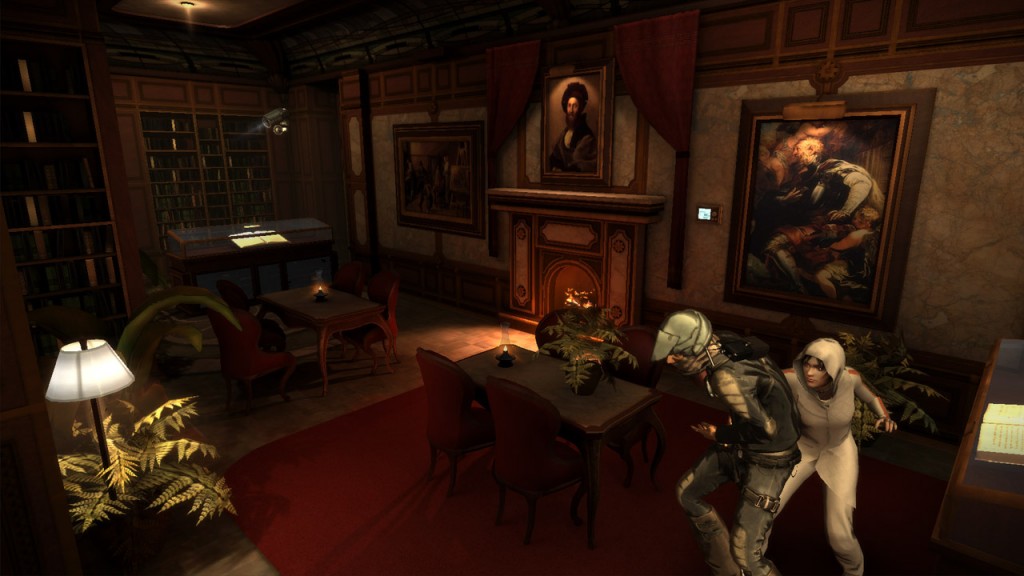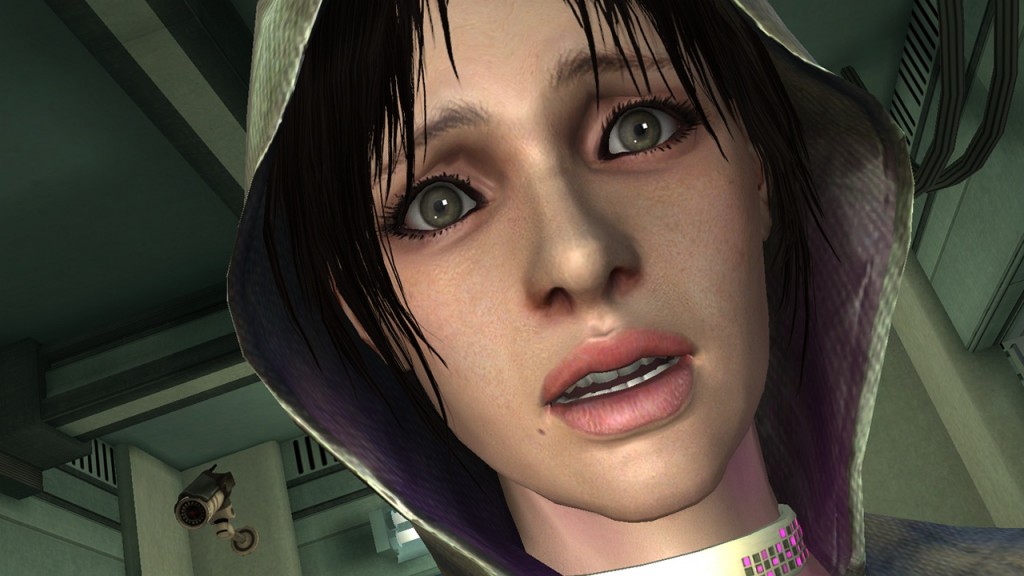Author’s Note: This review contains spoilers for Episode Two. The Gameplay section contains no major spoilers.
République is a cautionary tale of surveillance and censorship in the Orwellian tradition of dystopias, although it’s probably the first in which the surveillance cameras watching the protagonist’s every move are the most comforting presence in the game. The objective of the game is to help the protagonist, a girl named 390-H, or as she likes to call herself, Hope, escape the totalitarian state ruled with an iron fist by a man called the Overseer.
Gameplay
The gameplay for République is simple, but the main gameplay mechanism in République, moving from camera to camera around unsuspecting guards, never loses it’s fun suspenseful edge. It’s what lets me scout ahead, figure out the walking paths of guards, and then send Hope safely through when the guards aren’t looking. This is all thanks to a software called Omni-view, which allows the player to take control of the République’s high tech system so they can access emails and voicemails, distract guards by setting off the alarm system, and unlock doors so Hope can continue through the compound. At one point I realized that in addition to unlocking doors I could also lock them. So I locked a guard in a supply closet. Listening to his indignant muttering was easily one of the highlights of my gaming experience.
With the simple gameplay mechanics, player innovation is inevitable, and the little tutorial there was never felt like hand-holding, instead allowing the player to feel like an innovation was their idea all along. No doubt someone thought of locking guards out during development, but because no tutorial ever told me to, it felt like my victory, my problem solving that let Hope sneak by as the guard was stuck.
Most of the story is told through documents and items the player can find lying around. The player can click on newspapers, access emails, listen to voicemails, or just click on items with “memories” attached to them activating a voiceover that comments on the item you’re looking at. A corrupt reporter talks candidly about the newspaper article when you pick it up, or clicking on the fish bowl in Hope’s room activates a voiceover of her talking to the fish, telling it about a crush she has on a boy in her class.
This delivery method makes it entirely possible to skip the story and just play for the stealth gameplay, although I’m not sure why you’d want to. The gameplay itself isn’t challenging once you get the hang of it, so the somewhat epic story is the game’s main attraction. Gameplay becomes even less challenging after Tasers are introduced about halfway through episode one. A Taser knocks a guard out indefinitely and if caught by a guard, Hope automatically uses whatever weapon she has equipped, which means guards eventually just stopped being a threat.
République is hardly the first game set in a totalitarian dystopia, and it’s hard not to be reminded of the Bioshock series as the player explores elegantly decorated hallways and walks past impressive statues and art. There are also more literary inspirations, and the game brings that influence front and center in the form of books that the player can find as they explore the complex. The Scarlett Letter, Animal Farm, Naked Lunch, and Fahrenheit 451 are all left on desks, behind boxes, tucked almost out of sight on shelves. Their presence argues the inevitable spread of banned literature even in the face of totalitarian control, and finding each book is like finding a little reading recommendation from the developers.
It’s books like this that we learn have Hope in trouble: she keeps getting caught reading them. As it’s her third offense, she’s been assigned for “recalibration,” which doesn’t sound like a word that should be applied to a person.
Overall
“They want to erase me. They want to erase who I am.”
The first thing I notice about the game is that the graphics are pretty good for a mobile game. I’m playing on my iPhone, and on the close-up of Hope’s face her expression doesn’t seem awkward or stilted, a common problem for mobile games. From the angle of the camera and the frantic way it’s moving back and forth in the girl’s hand, it’s easy to tell that I’m seeing through what is probably a cell phone.

“You have to help me. They’re going to hurt me, recalibrate me.”
We’re in a holding cell now. Moments ago, she was dragged out of her room, but Hope still has the phone, and I’m watching from the same perspective as before. She’s scared. She wants to know if I can help, if I can do anything.
In République the very surveillance cameras installed to spy on citizens are the player’s eyes and ears. Behind Hope on the wall of the holding cell there’s a camera. I jump to it. The screen pulsates, breaks, dissolves, and I’m watching from the surveillance camera hanging from the holding cell wall. For a second Hope’s delighted, but then the energy drains from her.
“Yeah. What’s the difference? There’s no way you can help me from there… You’re just another pair of eyes, watching me.”
I turn my attention to the door of the holding cell, which I can now see from the surveillance camera on the wall. The door unlocks with a satisfying click.
“Did you do that? Did you open the door?”
Hope is delighted, moving cautiously to the cell door and peeking outside. As she steps through the doorway, the real gameplay begins. The camera jumps automatically to show the empty corridor, and from there hands the controls over to me, giving me the option to jump to a new security camera.
I love a good stealth game. There’s something enjoyable about carefully sidestepping guards, the constant suspense of getting caught, and République is a very good stealth game, but something about Hope kept bothering me.
Hope’s definable trait is her helplessness. Without the player to open doors or direct her down corridors and into hiding places, Hope would be locked in a holding cell or having her brain rearranged in some dimly lit laboratory. Hope rarely speaks, and if she does, she’s usually begging for help from the player.
There’s nothing wrong with having a female character that isn’t all guns and macho. Every kind of woman should be represented in gaming from the brazen and bold to the cautious and kind, and just Hope’s existence bucks the common trend of dull male cookie-cutter main characters. What makes Hope problematic isn’t her meek demeanor: it’s that in a game where she’s supposed to be the protagonist Hope has no agency, no control within her own story.
République is about the importance of free will, yet another party – the player – makes all of the choices for the protagonist. I direct Hope from room to room, tell her where to stand, sometimes lead her into danger and tell her to attack guards. If Hope was the player character, this wouldn’t be a problem, but the game is set up for Hope to meekly follow the commands of some unnamed individual watching from surveillance cameras, and isn’t that its own recipe for a dystopian novel?
At one point in the second episode, and this is a huge spoiler so skip to the next paragraph if you don’t want it ruined, we run across the dead body of Hope’s mentor, the Librarian. The player is given the option to either show Hope the footage of the Librarian getting killed or watching the footage alone. If I had to guess, I’d say the developers meant this to be an ethical problem for the player. The totalitarian government in République is often justified by the logic that it protects citizens from the harsh realities of the outside world. But it seems odd that the player gets to decide if Hope watches the video. Why isn’t she making that choice herself? If République is really about the fight for free will, why doesn’t Hope have any free will?
Maybe that’s entirely part of the developers’ designs. Because of the episodic game delivery, it’s hard to say for certain. The story might take a turn in a different direction in the next few episodes and question the control the player has over Hope, but from the trajectory of the first two episodes that only seems faintly possible.
République has two of the planned five episodes released, with the third episode set to release sometime this summer. The first episode of République is free, and access to the second episode along with future access to the rest of the unreleased episodes is unlocked as a $15.99 in-app purchase. If you enjoyed exploring the remains of Bioshock’s dystopia, you’ll probably enjoy exploring in this stealth thriller, and despite its problems I’m recommending this game.
4 out of 5 stars
Mallory Hagmann is a staff writer for Girls in Capes. Her interests include webcomics, poetry, fantasy and sci-fi novels, and whatever she’s fished from her local comic book store this week. She can be found in Denton, Texas.






